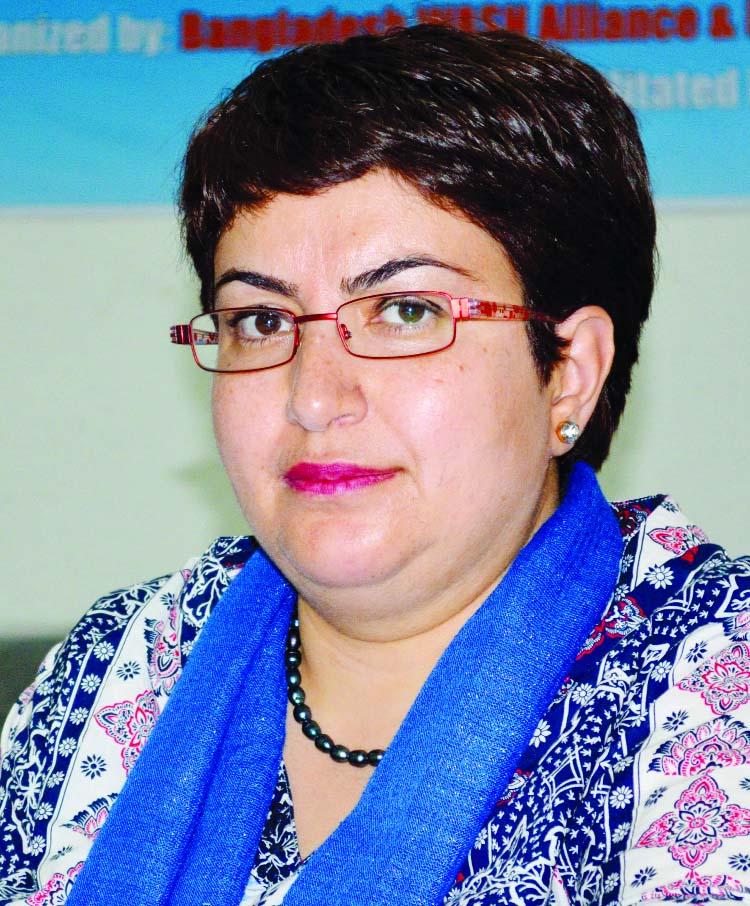
Tareen Rahman :
Senior Programme Officer of WASH Asia (Water, Sanitation and Hygiene Programme) a sister of Simavi, and other health organizations, Sara Ahrari said that their organization was very happy with the rapid progress in rural Bangladesh in the fields of water, sanitation and hygiene . She opined that sexual and reproductive health and hygiene of women has achieved a sustainable development plateau due to the continuous effort of Simavi.
Sara Ahrari arrived in Bangladesh recently at the invitation of DORP (Development Organization of the Rural Poor), to attend a national seminar on ‘Menstrual Hygiene Situation and Future Action’ organized by Bangladesh WASH Alliance & Partners facilitated by DORP.
Sara Ahrari appeared extremely optimistic about the development of rural Bangladesh and slum areas as she has been closely involved with all development work in our country for the last fifteen years. Sara remarked on the very positive progress of DORP in Community Mobilization and Budget Tracking in Bangladesh.
Simavi has been working in Bangladesh for the past 30 years and a member of Dutch WASH Alliance. Sara told our correspondent in an exclusive interview that Simavi believes that everyone has a right to good health. That is why Simavi works on people’s health in the poorest regions of the developing countries.
Sara happily expressed the objectives of Simavi in Bangladesh. She said,’ We focus specifically on the health of mothers, as they are the key to their family’s health. Together with them we provide for safe drinking water, sufficient hygiene, healthy pregnancies and improved children’s health. We also provide mothers with the knowledge they need to prevent diseases.’
When asked about the vision of WASH in Bangladesh, Sara said, ‘Health is a condition for sustainable development. Every human being has the right to health, including the right to safe drinking water and sanitation. For the realization and sustainable preservation of those rights, it is essential that people are able to exercise influence over their own living conditions.’
Senior Programme Officer of WASH Asia (Water, Sanitation and Hygiene Programme) a sister of Simavi, and other health organizations, Sara Ahrari said that their organization was very happy with the rapid progress in rural Bangladesh in the fields of water, sanitation and hygiene . She opined that sexual and reproductive health and hygiene of women has achieved a sustainable development plateau due to the continuous effort of Simavi.
Sara Ahrari arrived in Bangladesh recently at the invitation of DORP (Development Organization of the Rural Poor), to attend a national seminar on ‘Menstrual Hygiene Situation and Future Action’ organized by Bangladesh WASH Alliance & Partners facilitated by DORP.
Sara Ahrari appeared extremely optimistic about the development of rural Bangladesh and slum areas as she has been closely involved with all development work in our country for the last fifteen years. Sara remarked on the very positive progress of DORP in Community Mobilization and Budget Tracking in Bangladesh.
Simavi has been working in Bangladesh for the past 30 years and a member of Dutch WASH Alliance. Sara told our correspondent in an exclusive interview that Simavi believes that everyone has a right to good health. That is why Simavi works on people’s health in the poorest regions of the developing countries.
Sara happily expressed the objectives of Simavi in Bangladesh. She said,’ We focus specifically on the health of mothers, as they are the key to their family’s health. Together with them we provide for safe drinking water, sufficient hygiene, healthy pregnancies and improved children’s health. We also provide mothers with the knowledge they need to prevent diseases.’
When asked about the vision of WASH in Bangladesh, Sara said, ‘Health is a condition for sustainable development. Every human being has the right to health, including the right to safe drinking water and sanitation. For the realization and sustainable preservation of those rights, it is essential that people are able to exercise influence over their own living conditions.’

